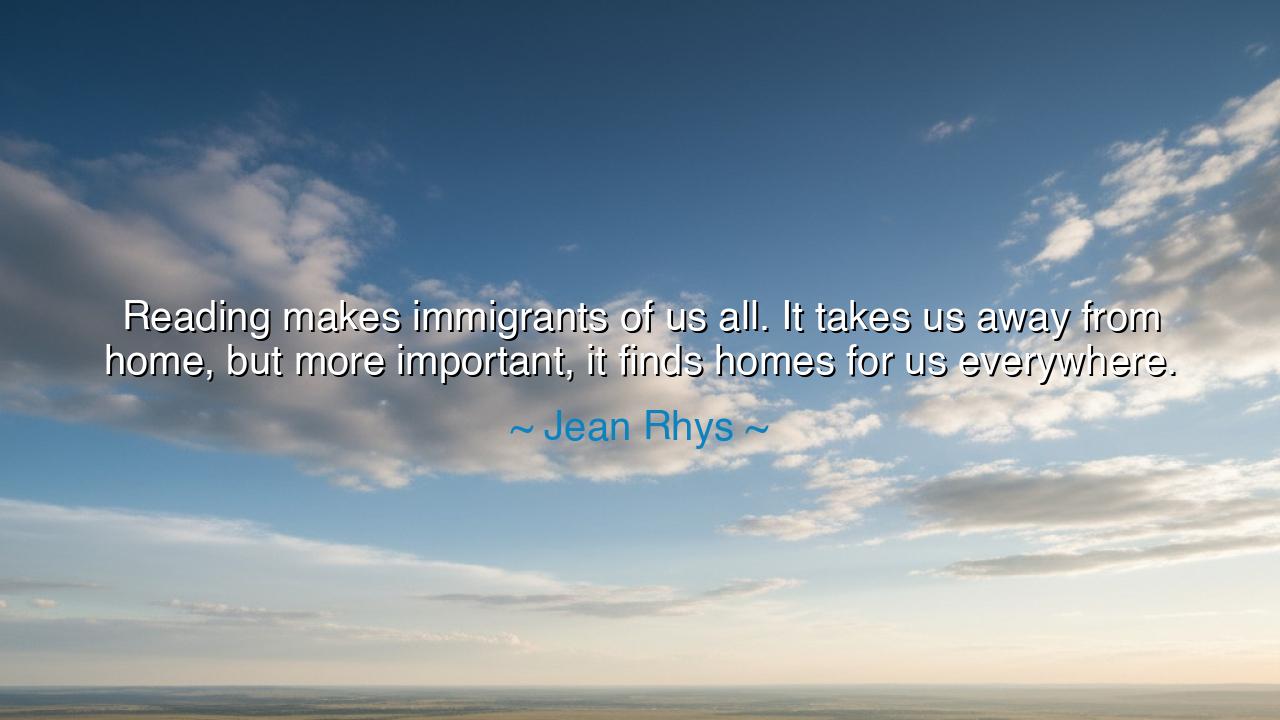
Reading makes immigrants of us all. It takes us away from home
Reading makes immigrants of us all. It takes us away from home, but more important, it finds homes for us everywhere.






The novelist Jean Rhys, born in the Caribbean and exiled for much of her life in Europe, once wrote: “Reading makes immigrants of us all. It takes us away from home, but more important, it finds homes for us everywhere.” These words carry both the ache of distance and the balm of discovery. They speak not only of books, but of the eternal human longing for belonging — that gentle yearning to find a place, real or imagined, where the heart feels understood. Through the act of reading, Rhys tells us, we journey beyond the narrow borders of our origin and step into the vast, shared home of humanity.
In her own life, Jean Rhys understood the pain of dislocation. Born on the island of Dominica, she later moved to England, where her accent, her mixed heritage, and her foreignness marked her as an outsider. Yet through the written word — both as reader and writer — she found communion with distant souls. Books became her passage across boundaries, her bridge to worlds that accepted her when the real one did not. When she wrote these words, she was not merely speaking of literature as entertainment, but as salvation, as the sacred art of finding oneself in the words of another.
To say that “reading makes immigrants of us all” is to acknowledge the transformative power of imagination. Every time we open a book, we leave behind the comfort of the familiar. We travel through time and language; we become strangers in ancient lands or future realms. Like the immigrant, we learn to navigate new customs, to adopt new ways of seeing. And yet, paradoxically, in being displaced by story, we come to know ourselves more deeply. For what is exile, if not the teacher of empathy? What is reading, if not the soul’s voyage toward understanding?
The ancients knew this truth long before the age of the printed word. When Odysseus wandered far from Ithaca, he became not just a hero, but a symbol of the universal exile — the one who leaves home only to discover that home lives within him. Likewise, every reader is an Odysseus of the mind. Each book we read calls us from the shores of certainty, through tempests of emotion and discovery, until at last we arrive — changed, enriched, and strangely at home in places we have never seen. Reading does not only transport us outward; it also returns us inward, to the vast continents of the heart.
Consider, too, the refugee, the migrant, or the traveler who carries no possessions but carries stories. Books, like memories, are portable sanctuaries. They offer home to the homeless, solace to the lost, companionship to the solitary. When a Syrian child reads The Little Prince, when an Indian farmer reads Tolstoy, when a woman in Paris reads Chinua Achebe, each finds a bridge between worlds. Through story, the stranger becomes familiar, the foreign becomes human. Thus, reading dissolves borders, not by denying difference, but by revealing the shared essence beneath it — the longing to love, to suffer, to endure, to hope.
And this is the miracle at the heart of Rhys’s reflection: that books give us many homes. They plant us in countless lives, countless landscapes. One moment, we dwell among the snows of Siberia; the next, we are walking beneath the cherry blossoms of Kyoto. Through reading, we live a thousand times before we die once. We cease to belong to one nation, one tribe, one language — and instead, we belong to the great family of dreamers, thinkers, and seekers who have walked this earth before us. In this sense, reading is both departure and return, both exile and belonging.
Therefore, let this be the lesson drawn from Jean Rhys’s wisdom: to read is to become infinite. Do not read only for knowledge or pleasure, but to expand the borders of your compassion. Let every story you encounter teach you to see through another’s eyes, to feel with another’s heart. For when you do, you will no longer fear difference; you will recognize it as the mirror of your own humanity.
And so, my child of the future, remember: the true home of the soul is not a house of walls and stones, but a house of words and meanings. Open a book, and you open a doorway into every land, every time, every heart. Be unafraid to become an immigrant of the imagination, for in doing so, you will find that every story — like every life — leads to the same truth: that though we wander, we are never lost, for the world itself becomes our home.






AAdministratorAdministrator
Welcome, honored guests. Please leave a comment, we will respond soon